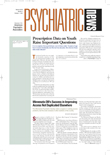Computer-savvy patients want to e-mail their physicians about routine matters, but physicians are reluctant to use standard e-mail because of the lack of security, liability risk, and lack of reimbursement, according to recent physician surveys.
Two recent announcements from Medem Inc., an online physician network based in San Francisco, may entice more physicians to try online communication with patients.
The company, which was founded in 1999 by the AMA and a number of medical specialty societies including APA, recently announced new guidelines for physician-patient electronic messaging. CEO Edward Fotsch, M.D., told Psychiatric News that the guidelines were developed by the eRisk Working Group for Healthcare, a consortium of medical societies, including the AMA, medical liability insurers, and the Federation of State Medical License Boards.
“It was important to develop uniform guidelines given recent actions by state medical boards against online physician networks and the risk of liability,” said Fotsch.
Physicians in North Carolina and Illinois have been ordered by state medical authorities to stop prescribing for patients they never saw, according to Fotsch.
The most recent action was taken by the Illinois Department of Professional Regulation against MyDoc.com. MyDoc.com is owned by Roche Diagnostics, a division of Hoffman-LaRoche, a pharmaceutical firm in Switzerland.
“Our eRisk guidelines specifically state that physicians should use e-mail only with patients they have already evaluated in person and not for emergencies,” said Fotsch.
The eRisk guidelines urge physicians to use secure online networks that provide encryption and identity verification. These features protect patients’ privacy and enhance compliance with the federal privacy rule mandated under the 1996 Health Insurance and Portability and Accountability Act. Physicians have until April 15 to comply with the rule.
The guidelines urge physicians to use the informed consent process with patients to review appropriate uses and limitations of online communication. Medem has an informed consent form integrated in its Online Consultation Terms of Service process. “Patients must consent online; otherwise, they can’t use our e-messaging service,” said Fotsch.
A handful of online physician networks including Medem and RelayHealth in the San Francisco area provides physicians with secure networks using encryption. Jason Wong, Medem’s network director, told Psychiatric News that encryption technology encodes messages sent to recipients so that unauthorized users can’t understand them.
“This is also more secure than standard e-mail because messages remain on the company’s server rather than travel between servers owned by different companies,” said Wong.
Harold Rauch, M.D., a child and adolescent psychiatrist in Austin, Tex., and an APA member, told Psychiatric News that he has been using Medem’s Online Consultation service for nearly a year. That is the latest feature Medem added to its secure messaging tools that patients use typically to request appointments and prescription refills, according to Fotsch.
Rauch said, “Medem is free to APA members. But, the most important factor in influencing my decision to try Online Consultation was the increased network security.
“I also decide whom I should grant e-messaging privileges to. Medem requires physicians to verify a patient’s identity as part of the authorization process. I also must decide whether or not that particular patient is a good candidate to use Online Consultation.”
Physicians using Medem’s Online Consultation charge patients an average of $25 for each e-mail visit, said Fotsch. Rauch said he charges between $12.50 and $25 for an online consultation, depending on the complexity and time involved.
“I charge a fee for the consultation with few exceptions because I want to convey to patients that this is a professional service and discourage them from overuse,” said Rauch.
He doesn’t charge one patient who uses Online Consultation to transmit a daily journal of how he copes with psychosocial stressors at work. “I see this patient only once a month, and his online diary allows me to keep up with how he is coping and respond if needed,” said Rauch.
He also doesn’t charge another patient to use Online Consultation daily. “The patient has severe depression and lives too far away for daily office appointments. This allows us to maintain daily contact,” said Rauch.
Other benefits of Online Consultation are decreased telephone time with patients, increased documentation in the patient’s chart, and more time to evaluate the problem and formulate a carefully worded response, he said.
“My patients use Online Consultation because it provides an alternative to an often busy telephone system and scheduled appointments for nonemergency contact with me. Another use is to document ongoing stressors in patients’ lives that don’t require immediate physician contact,” said Rauch.
He covers conditions of online use with patients during his informed consent process. “I tell them my response time may take between 24 and 48 hours and that urgent requests for help have to be made through traditional channels,” said Rauch.
The eRisk Working Group on Healthcare’s Guidelines for Online Communications are posted on Medem’s Web site at www.medem.com/corporate/corporate_Addendum_A_eRiskGuidelines.cfm#medem_erisk. ▪
